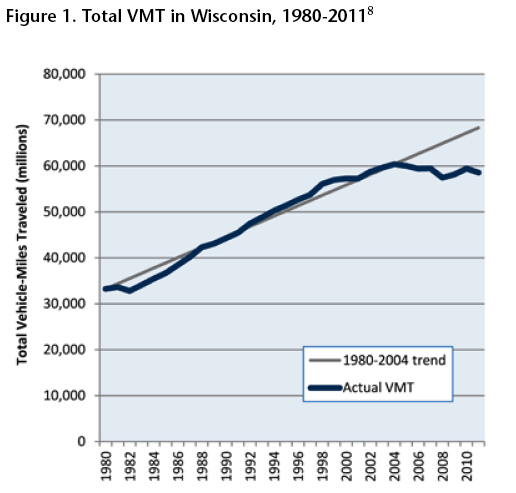In the 1990s, Wisconsin proposed a bypass for the town of Burlington (population 10,000). The $118 million project was sold as a way to reduce traffic in the center of the city, which includes the junction of four state highways.
The 11-mile highway opened in 2010. But traffic never lived up to the projections WisDOT offered to justify it. Today, traffic volumes are 33 to 36 percent below forecasts, reports the Wisconsin Public Interest Research Group [PDF]. WisPIRG says that by 2010, WisDOT officials projected about 11,000 cars would travel the road daily, but actual counts in 2011 were between 7,000 and 7,400.
WisPIRG examined seven major highway projects undertaken by the state of Wisconsin over the last two decades at a public cost of more than $1 billion. The group found that WisDOT consistently overstated the case for expanding highways.
On U.S. Highway 41 in Marinette and Oconto counties -- which underwent a $180 million expansion, converting a two-lane country road into a four-lane highway with three bypasses -- traffic volumes were projected to increase 35 to 71 percent by 2025. But by 2012, actual traffic counts were still below what they were expected to be five years prior, in 2007.
The state completed the $109 million expansion of State Highway 64 in St. Croix in 2006, anticipating traffic volumes would increase 75 to 101 percent on sections of the road by 2016. So far traffic counts have been far below expectations, edging up only 21 and 56 percent, respectively.
Officials from WisPIRG say the faulty projections would be forgivable, given the unexpected reduction in driving that began before the start of the economic downturn. But recent studies, like this month’s report by U.S. PIRG, have found driving continues to dip around the country even as the economy improves. The U.S. PIRG report shows it's part of a broader cultural trend, set into motion by numerous factors including the changing preferences of young people. The average Wisconsinsite drove fewer miles in 2011 than in 1997. Meanwhile, WisDOT continues to prioritize highway investment over all other modes.
"With transportation needs changing -- and with Wisconsin making critical choices about its transportation future -- the time has come to reevaluate whether highway expansion projects planned years ago are still a wise investment of public money," wrote report authors Tom Van Heeke, Tony Dutzik, and Bruce Speight. "It is also time to reevaluate whether other transportation investments that would be sacrificed in the pursuit of even bigger highways -- such as improvements in public transportation -- might not deliver greater benefits."
Instead of reducing funding for highway projects as driving slumps, the state of Wisconsin has shifted more resources toward road expansion projects. PIRG reports Wisconsin has dedicated $1.2 billion in its latest budget for highway construction projects. To fund these highway investments the state reduced the amount of gas tax revenue it returns to local governments. The state also slashed state spending on transit by 10 percent, a decision that has been particularly disastrous for Milwaukee, WisPIRG finds. In addition, to pay for the additional highway capacity, Wisconsin raided $160 million from the general fund over the past two years. The new budget proposes pilfering an additional $23 million, from education, healthcare and other important state priorities.






